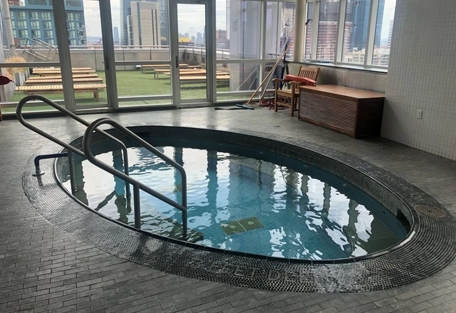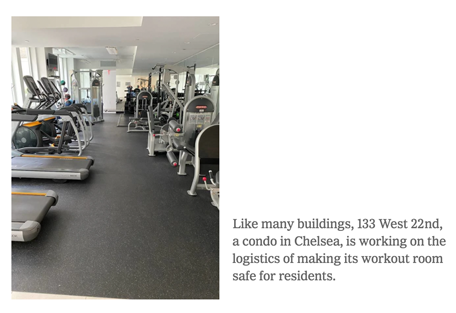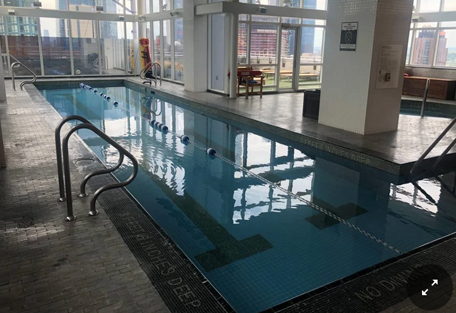
How to Reopen Building Gyms and Pools
The New York Times Real Estate Section: Sheltering
By Joanne Kaufman
Published June 5, 2020
Updated June 7, 2020

For weeks, Melissa Cafiero, the director of compliance at Halstead Management, has been fielding phone calls and emails from residents of the co-op and condo buildings that her company oversees. They have been exercise-deprived since Gov. Andrew M. Cuomo’s Mar. 16 directive shuttering gyms to help contain the spread of Covid-19, and they think enough is enough.
Give them cardio. And give it to them now.
The distress calls to Ms. Cafiero and her colleagues are taking on a new urgency as New York City looks to start reopening. Many residential buildings have already reopened their roof decks (or didn’t close them in the first place), while limiting occupancy and requiring masks and social distancing.
When it comes to amenities like pools and gyms, however, landlords and co-op and condo boards are aware of residents’ desires, but proceeding with extreme caution.
“Gyms are the thing everyone wants to see open,” said John Janangelo, the executive managing director of Douglas Elliman Property Management. “And gyms present the biggest challenge.”
Among the challenges is the placement of cardio equipment, like treadmills and elliptical machines, which tend to be arranged in serried ranks. Some buildings are weighing the advantages of removing some machines to ensure proper social distancing or, space permitting, dispersing the machines around the workout floor. Other options include disabling or roping off equipment.

“If there are two treadmills side by side, we’re going to shut one off,” said Daniel J. Wollman, the chief executive of the property management company Gumley Haft, who is also suggesting to clients that, initially at least, they clear workout rooms of mats, balls, free weights — and personal trainers.
“As things change, we’ll bring them back,” Mr. Wollman said.
Of course, limiting the amount of equipment is just the beginning. Buildings also plan to limit the number of people in a gym at a given time, a number they’ll come up with based on the gym’s square footage.
“It’s common sense,” said Steven D. Sladkus, a real estate lawyer. “If the space is small, you may want to limit it to one person or one family at a time.”
In fact, according to a spokesman for the Empire State Development Corporation, gyms should remain closed until they get specific guidance from the state about proper protocols.
The gym at the rental building 525 West 52nd Street is tentatively scheduled to reopen June 8 on a reservation-only basis, with occupancy limited to five people and workouts capped at an hour.
“We’re dividing the fitness center into five zones and are asking that residents stay in one zone for the duration of their workouts,” said Agim Duraku, the building’s general manager. The layout is being modified to include an assortment of equipment in each zone.
Mr. Wollman, of Gumley Haft, said that his co-op and condo clients would similarly require residents to sign up in advance to use the gym, perhaps using a system like BuildingLink, and to limit the length of their workouts. “People will likely get 30 or 45 minutes, depending on how much demand there is,” he said.
Still to be nailed down is the apportioning of prime-time privileges. “A lot of people are going to want a 6 a.m. or 7 a.m. slot,” said Mr. Janangelo, of Douglas Elliman. “Maybe it’ll be that people will get it only every two or three weeks.”
There will be new floor signage to mark a one-way path around the space, said Ms. Cafiero, of Halstead Management, as well as signage to remind people to wipe down machines after use.
But buildings do not intend to rely exclusively on the disinfecting diligence of their residents. Mr. Wollman envisions a building staff member going to the gym to spray down the equipment after every workout session. “Our view is that we’ll close each day at noon for half an hour to do a deeper cleaning, reopen and maybe run the gym until 7:00, clean again and lock down until the next morning,” he said.

Buildings with pools are also trying to figure out a way forward. “There is no evidence that the virus that causes Covid-19 can be transmitted through the water in pools,” according to the Centers for Disease Control and Prevention. Further, proper operation and maintenance, including the use of disinfectants like chlorine or bromine, “should inactivate the virus.”
“The co-op and condo boards we’re working with are talking about having sign-up sheets, limiting the number of people in the pool and how long they can be in the pool,” said Adam Stern, the senior vice president of management at the property management company AKAM Associates.
An added complication is the pool deck. “We’re going to have disinfecting guidelines for the pool chairs and the access area to the pool,” Mr. Stern said.
Craig L. Price, a partner at the law firm Belkin Burden Goldman, suggested that the coronavirus could serve as a catalyst for co-ops and condos to take a good, hard look at their amenities and the risks they pose. “It may be that they’ll want to come up with different uses for some spaces,” he said.
Residents may be doing some risk assessments of their own. “There will likely be some people who will say, ‘I’d rather get a Peloton in my apartment and not pay part of my common charges for a gym,’” Mr. Price said.
In any case, the spontaneous trip to the building gym to work off the tension of the day is off the table, at least for the foreseeable future. So is possessiveness about the third treadmill in the row (that treadmill may be unplugged) or that special recumbent bike (it’s been an hour — time’s up).
“Some people aren’t going to be happy,” Mr. Janangelo said. “But we’re going to be living in a different world, and they’re going to have to get used to it.”
